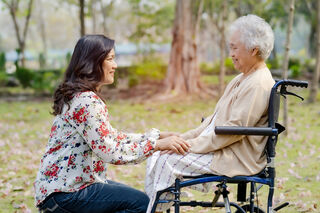Empathy
The Best Side Effect of COVID Vaccination
COVID-19 can bring us together in surprising ways.
Posted March 20, 2021 Reviewed by Jessica Schrader
I belong to an organization that meets monthly to focus on projects creating higher education opportunities for women. Like so many other groups, we’ve relied on Zoom for months. After the meeting, all of us talking heads in our little Zoom windows updated each other on what was going on in our lives. The dominant question was, “How sick did you get after the second shot?” Or for the younger members, “How sick did your parents get?”
It was not a repetitive, boring conversation. It was an exercise in empathy that felt like a real hug rather than the virtual hug it actually was.
In a weird way, I was glad that I’d had chills and vomiting for eight hours. The experience made me really listen to what other people were saying—genuinely care about how they had felt or were feeling at that moment.
When I had cancer and was going through chemotherapy, that was fundamentally a lonely experience. Sure, I could talk with other patients who had suffered the usual fatigue and hair loss, but I was never in a big room—like our Zoom room—where nearly everyone had a “sick story.”
Last year, just before the world shut down and we all hid behind closed doors, I went back to my hometown to bring my mother home from a facility where she’d gone for physical therapy after an illness. Most of the people there were elderly. As I’d walk down the hall and glance into rooms, I saw frail men and women in wheelchairs. Unlike my mom, most of them didn’t look hopeful. Many looked trapped in pain.
I thought about them after my eight hours of vaccine purgatory. An episode of discomfort that I knew, all along, would end soon.
And the next day at our post-meeting chat session, I remembered how I had felt, but that physical ordeal was over, an experience in my past. Only the empathy remained.
What a great side effect!
That’s why COVID can provide a “silver lining” and a new empathetic opportunity, according to Lynne Azarchi, author of The Empathy Advantage: Coaching Children to be Kind, Respectful and Successful:
“A new window opens to walk in the shoes of First Responders, the many families that have lost a loved one, or perhaps those long-termers suffering months from COVID’s side effect with no end in sight. It puts the side effects of the vaccine in perspective, allowing us to ‘feel’ for others and perhaps take empathetic action.”

When we observe people trapped in pain, we won’t just walk down the hall. We’ll take a precious minute, notice an empty water glass on a tray, and say, “Looks like you need a refill!” Then, we’ll take another precious minute and fill that glass. Pretty soon, the precious minutes of empathy become years of a more fulfilled, engaged life.
In terms of relationships, having the world be in close contact with the same disease and the same (or similar) nauseating immunization process may be a great blessing. It should provide perspective and remind us of others who have probably been more stressed, homeless, lost jobs, or suffered more. If a few more people, or maybe millions of them, let those experiences trigger their compassion, we will see a proliferation of healthy and empathetic connections.
COVID may be a killer, but it can also be a healer.
References
Azarchi, Lynn (2020). The Empathy Advantage. Lanham, MD: Rowman & Littlefield.


